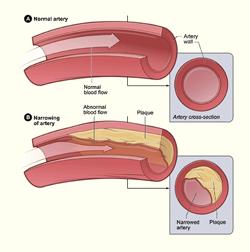
October 17, 2011 – The number of Americans who report they have coronary heart disease – which includes heart attack and angina (chest pain) – continues to decline but rates vary widely from state to state and by race and ethnicity, according to a new report published today in the Morbidity and Mortality Weekly Report of the Centers for Disease Control and Prevention (CDC).
From 2006 to 2010, the number of people in the United States who report they have been told by a health professional they have coronary heart disease declined overall from 6.7 percent to 6 percent. The data came from CDC?s Behavioral Risk Factor Surveillance System (BRFSS), a phone survey conducted each year of adults aged 18 and older.
The report attributes the decline to a combination of reductions in prevalence of high-risk populations for heart disease such as smokers, patients with uncontrolled high blood pressure, and uncontrolled high blood cholesterol along with improvements in treatments for heart disease.
Despite that decline, cardiovascular disease remains the leading cause of death in the United States killing roughly the same number of Americans each year as cancer, lower respiratory diseases (including pneumonia) and accidents combined.
The highest rates of self–reported coronary heart disease are among older adults aged 65 and older (19.8 percent) and American Indians/Alaskan Natives (11.6 percent).
The report also notes geographic differences in self–reported coronary heart disease. In 2010, coronary heart disease prevalence ranged from lows of 3.7 percent in Hawaii and 3.8 percent in the District of Columbia to highs of 8 percent in West Virginia and 8.2 percent in Kentucky. Generally, populations in Southern states reported the highest levels of coronary heart disease.
“Where you live and how you live matters to your heart,” said CDC Director Thomas R. Frieden, M.D., M.P.H . “The Million Hearts national initiative, which can prevent 1 million heart attacks and strokes over the next five years, focuses on actions people can take themselves and actions that businesses, communities and health providers can take to prevent heart attacks and strokes today.”
Million Hearts seeks to improve clinical care by helping patients learn and follow their ABCS:
- Aspirin for people at risk
- Blood pressure control
- Cholesterol management
- Smoking cessation
Fewer than half of Americans who should be taking an aspirin a day are taking one; fewer than half of Americans with high blood pressure have it under control. Only 1 in 3 Americans with high cholesterol is effectively treated, and less than a quarter of Americans who smoke get help to quit when they see their doctor.
“We're all at risk for heart disease and stroke,” said Jing Fang, M.D., epidemiologist with CDC?s Division of Heart Disease and Stroke Prevention. “People of all ages, genders, races, and ethnicities are affected. However, certain groups, including American Indians/Alaskan Natives, African-Americans and older adults, are at higher risk than others.”
The MMWR report on state coronary heart disease prevalence is available at www.cdc.gov/mmwr


 January 05, 2026
January 05, 2026 









